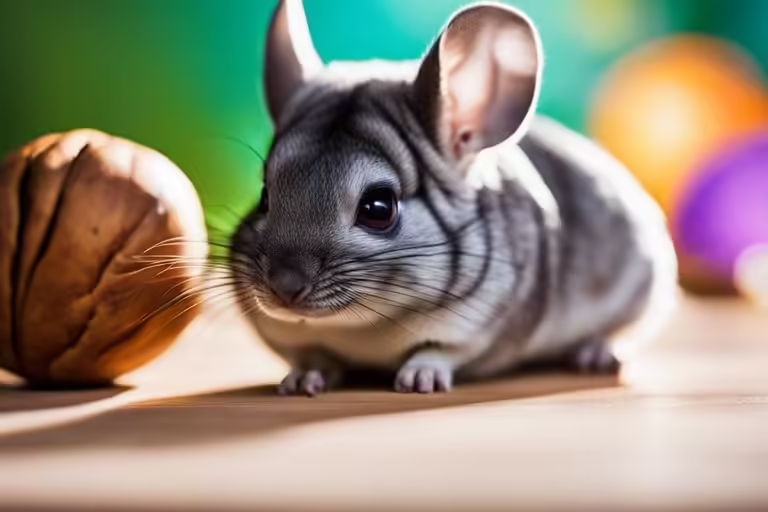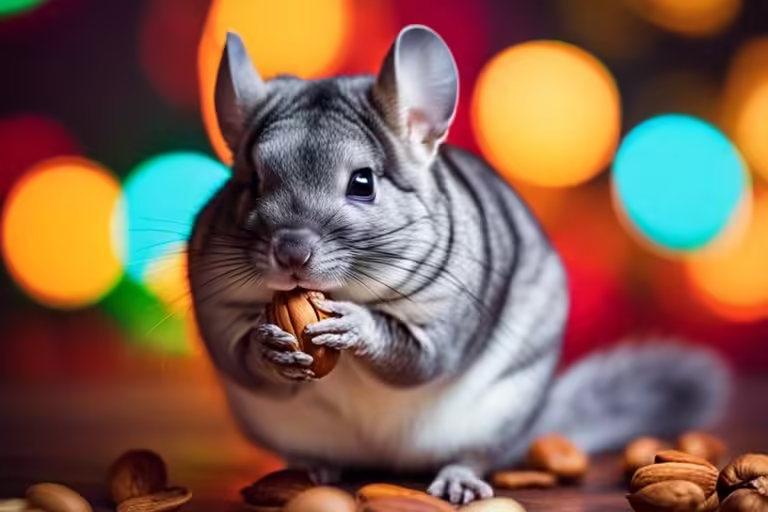No, Here’s Why You Should Avoid Them
Chinchillas have delicate digestive systems that require a specific diet to stay healthy. While pecans may be a tasty snack for humans, they are unsuitable for chinchillas. These nuts are high in fat and phosphorus, which can harm your pet’s health, leading to digestive problems, obesity, and even severe allergic reactions. Here’s everything you need to know about why pecans are a no-go and what you can feed your chinchilla instead.
Key Takeaways
- Pecans are harmful to chinchillas due to their high fat and phosphorus content, which can lead to digestive issues and obesity.
- Chinchillas require a high-fiber, low-fat diet consisting mainly of hay and chinchilla-specific pellets.
- Safe alternatives to pecans include fresh hay, chinchilla pellets, and occasional treats like small portions of dried fruits or vegetables.
Why Pecans Are Unsafe for Chinchillas
Pecans might seem harmless, but they pose significant risks to your chinchilla’s health. Here’s why:
High Fat Content
- Pecans are composed of 72% fat, while chinchillas require less than 5% fat in their diet.
- Excess fat can cause obesity, liver problems, and digestive distress in chinchillas.
Phosphorus Imbalance
- Pecans have a high phosphorus-to-calcium ratio, which can interfere with calcium absorption.
- Long-term phosphorus imbalance may weaken your chinchilla’s bones and teeth.
Low Fiber Levels
- Unlike hay or grass, pecans lack the high fiber content chinchillas need for proper digestion.
- A fiber-deficient diet can lead to gastrointestinal stasis, a life-threatening condition where digestion slows or stops entirely.
| Nutritional Element | Chinchilla Diet Requirements | Pecan Composition |
|---|---|---|
| Fat | Less than 5% | 72% |
| Fiber | High (20–25%) | Low |
| Phosphorus | Low | High |

Health Risks of Pecans for Chinchillas
Feeding pecans to your chinchilla can lead to several health issues:
| Risk | Impact on Chinchillas |
|---|---|
| Digestive Issues | Low fiber and high fat can cause bloating, diarrhea, and pain. |
| Obesity | Excess fat intake may lead to weight gain and related diseases. |
| Nutritional Deficiency | Pecans lack essential nutrients like calcium and fiber. |
| Allergic Reactions | Pecans may cause symptoms like itching, swelling, or difficulty breathing. |
Safe Alternatives to Pecans
Instead of pecans, feed your chinchilla these safe and healthy options:
1. Hay and Grass
- Timothy hay or orchard grass should make up 80–90% of your chinchilla’s diet.
- Hay provides fiber for digestion and helps wear down continuously growing teeth.
2. Chinchilla Pellets
- Use chinchilla-specific pellets with balanced levels of fiber (20–25%) and fat (<5%).
- Avoid pellets containing seeds, nuts, or sugary additives.
3. Fruits and Vegetables (Treats Only)
- Safe fruits: Apples, blueberries, pears (small portions only).
- Safe vegetables: Carrots, bell peppers, kale (offered sparingly).
- Always wash produce thoroughly and remove uneaten portions to avoid spoilage.
| Safe Foods | Unsafe Foods |
|---|---|
| Timothy hay | Pecans |
| Chinchilla pellets | Sunflower seeds |
| Apples, blueberries | Avocado, bananas |
| Carrots, bell peppers | Cabbage, rhubarb |
Signs of Nutritional Imbalance in Chinchillas
Monitor your chinchilla for symptoms that may indicate dietary issues:
- Weight Changes: Sudden loss or gain could signal improper nutrition.
- Digestive Problems: Bloating, diarrhea, or reduced stool output.
- Fur Quality: Rough, dull fur may result from vitamin deficiencies.
- Dental Issues: Overgrown teeth due to lack of hay can cause eating difficulties.
What to Do in an Emergency
If you’ve run out of chinchilla food or hay, here are temporary alternatives:
- Leafy Greens: Kale, arugula, or Bok choy (small portions).
- Other Options: Rolled oats, unsprayed rose petals, or non-frosted shredded wheat.
These should only be used short-term until you can replenish your chinchilla’s hay and pellets.
Frequently Asked Questions
Q: Can chinchillas eat pecans?
A: No, chinchillas should not eat pecans. Pecans are high in fat and phosphorus, which can cause obesity and digestive issues in chinchillas.
Q: Why are pecans bad for chinchillas?
A: Pecans contain excessive fat and low fiber, which disrupts the delicate balance of a chinchilla’s diet. Long-term consumption can lead to obesity, malnutrition, and other health problems.
Q: What are safe treats for chinchillas?
A: Safe treats include hay, chinchilla pellets, and small amounts of fruits like apples or blueberries. Always offer treats in moderation to avoid digestive problems.
Final Thoughts
Pecans and other high-fat foods are unsuitable for chinchillas due to their sensitive digestive systems. Instead, stick to a diet of timothy hay, chinchilla-specific pellets, and occasional safe treats to keep your furry friend healthy and happy.
When in doubt about your chinchilla’s diet, consult a veterinarian to ensure you’re meeting their nutritional needs. A balanced diet is key to helping your chinchilla live a long, vibrant life.
